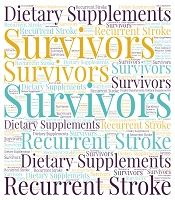Dear Editor,
Stroke is a leading cause of disability and mortality globally, with survivors facing a high risk of recurrence that exacerbates complications and hinders rehabilitation. Nutritional status is a critical determinant of recovery and secondary prevention. Dietary supplements have been investigated for their potential to reduce recurrent stroke risk and support rehabilitation, but their efficacy remains debated. This letter examines the role of supplements in stroke care, emphasizing evidence gaps and the need for integrated approaches (1).
Stroke survivors frequently experience malnutrition due to dysphagia, neurological deficits, and reduced mobility, which impair nutrient intake and metabolism. Malnutrition prolongs hospital stays, increases complications, and worsens functional outcomes, particularly in recurrent stroke patients who often exhibit poorer nutritional status than first-time stroke survivors. Addressing these deficits through targeted nutritional interventions is essential for optimizing recovery (2).
The hypothesis that dietary supplements, particularly B vitamins and antioxidants, may prevent recurrent stroke stems from their ability to lower homocysteine levels and mitigate oxidative stress (3). For example, a 2015 meta-analysis of 17 trials (n = 73,432) found that folic acid supplementation reduced stroke risk by 10% (RR: 0.90, 95% CI: 0.82 - 0.99), particularly in populations with low baseline folate levels. However, evidence on recurrent stroke prevention is less clear. The vitamin intervention for stroke prevention (VISP) trial (n = 3,680) showed no significant reduction in recurrent stroke with high-dose B vitamins (HR: 1.0, 95% CI: 0.8 - 1.3), possibly due to insufficient folate fortification in the study population or concurrent use of statins masking benefits. A 2018 meta-analysis of two trials (n = 4,837) similarly found no effect (RR: 0.94, 95% CI: 0.77 - 1.15), with limitations including heterogeneous supplement regimens and short follow-up periods (1 - 2 years). These discrepancies highlight methodological challenges, such as inconsistent dosing (e.g., 0.5 - 5 mg/day folic acid), variable baseline nutritional status, and genetic polymorphisms affecting homocysteine metabolism (e.g., MTHFR gene variants). These factors underscore the need for standardized protocols in future trials (4).
In contrast, dietary supplements show clearer benefits in stroke rehabilitation. Protein supplementation, such as whey protein (20 - 30 g/day post-exercise), enhances muscle protein synthesis, improving motor function and activities of daily living in malnourished patients. A 2020 randomized controlled trial (n = 150) reported a 15% improvement in Functional Independence Measure scores with whey protein versus placebo (P = 0.02). Antioxidants like vitamins C (500 mg/day) and E (400 IU/day) and minerals like magnesium (400 mg/day) address post-stroke fatigue and muscle wasting, while polyphenols and probiotics may support neuroprotection by reducing inflammation. These interventions are most effective when initiated early in the acute phase and monitored throughout rehabilitation, as recommended by clinical guidelines (5).
Despite these benefits, socioeconomic barriers — such as limited access to nutrient-rich foods, dietary counseling, or supplements — exacerbate malnutrition, particularly in low-income populations. For instance, a 2021 study found that 30% of stroke survivors in underserved communities reported food insecurity, correlating with poorer nutritional outcomes. Costly supplements and lack of insurance coverage for dietitian services further limit access, necessitating policy interventions to improve equity in stroke care (6).
Current evidence on supplements for recurrent stroke prevention is inconclusive due to low-quality studies and multifactorial stroke pathogenesis. Supplements alone cannot replace comprehensive risk factor management, including hypertension control, diabetes management, and lifestyle modification. Repetition of malnutrition’s impact is avoided here to focus on actionable insights: Integrated strategies combining targeted supplementation (e.g., individualized B-vitamin dosing based on homocysteine levels), dietary optimization, and exercise yield better outcomes than supplementation alone. Larger, well-designed trials with longer follow-up (≥ 5 years) and personalized approaches accounting for genetic and socioeconomic factors are needed (7).
In conclusion, dietary supplements play a vital role in stroke rehabilitation by addressing malnutrition, enhancing muscle strength, and supporting neuroplasticity. However, their impact on preventing recurrent stroke is limited without holistic risk management. Multidisciplinary stroke programs incorporating dietitians, neurologists, and rehabilitation specialists, alongside policies to address socioeconomic barriers, are essential to optimize nutritional care and improve survivors’ quality of life.
